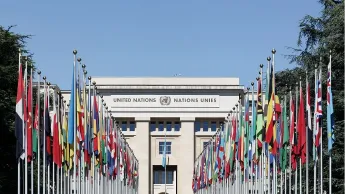Working for the United Nations: in service for the world
- 2018-05-29
- Sabine Giehle
- Comment

Working for the United Nations is no run-of-the-mill job, as Peter Schniering well knows. The climate and energy expert frequently works for the UN. And he highly recommends it. But how do you join the UN?
UN staff work in Abu Dhabi, Bangkok, New York, Geneva, Montreal, Tunis, Kabul, Paris, Beirut or in one of more than 60 other cities around the globe. Some and with a wide range of skills and professional backgrounds work for the international community. DAAD alumnus Dr. Peter Schniering, managing director of a technology firm and a specialist in international climate and energy policy, is one of them.
Peter Schniering’s work with the UN began when he was researching his doctorate. He had just completed his studies at the University of Bonn and was working on his doctoral thesis on the US climate protection strategy. As part of his research, he contacted the United Nations Climate Secretariat (UNFCCC) in Bonn.
The doctoral student’s visits marked the beginning of a long-term working relationship. In the intervening years, Peter Schniering has frequently worked on various cooperation projects with the UN climate secretariat and its experts: first as a consultant and later in courses on the cost-effectiveness of renewable energy technologies.
2014 United Nations Interns
Interns and staff members share their unique experiences about working as global citizens at the New York headquarters.
What jobs are available?
Besides teaching assignments, project-based consultancy agreements and internships, there are many regular, permanent positions at the United Nations. More than half of the UN’s 44,000 staff are deployed in its missions on the ground – in development cooperation, humanitarian aid projects, as election observers or on peace missions. Virtually all professional profiles are needed: from security specialists to purchasing managers, and from experts on geoinformation to fire safety engineers.
In addition, scientists, IT specialists, lawyers, financial and administrative experts, and translators work at the New York headquarters, the official UN offices in Geneva, Nairobi and Vienna, or at one of the official headquarters of the 15 United Nations specialised agencies, such as the FAO (Food and Agriculture Organization of the United Nations), UNESCO (United Nations Educational, Scientific and Cultural Organization) or the International Monetary Fund (IMF).
What are the requirements?
While the professional skills required vary from job to job, the United Nations places great importance on the suitability of the applicant’s personality and character, because the UN sees itself as a service provider for humanity. That is why the UN seeks to recruit very special personnel: “We want people with integrity. People who are fair, impartial, honest and truthful. We want dynamic and adaptable persons who are not afraid to think creatively, to be proactive, flexible and responsive,” as the UN website puts it.
How can I apply?
If you think you match the description, if you are willing to work in different locations around the globe and would like to serve the world community, the United Nations has created an easy way for you to apply. All jobs are advertised on the , where you will find detailed information on requirements and remuneration as well as assistance with your application.
It is worth applying!
Peter Schniering has also learned that working for the UN is a rewarding experience: “Working for the United Nations has enriched me enormously. I would advise anyone to apply and gain experience through a scholarship or an internship. At the UN, you can learn what working at a really high international level means.”
Peter Schniering, who has also worked for the OECD (Organisation for Economic Co-operation and Development), has another recommendation: “Whether you go on to work in industry, science or in the public sector, it’s very often a matter of making decisions, reaching compromises and convincing partners in multinational structures. There’s no better place to learn this than in an international organisation.”
Have you also worked for international organisations? What did you learn from the experience? And what is particularly important to you in your job? Tell us about your experiences in the comments!
